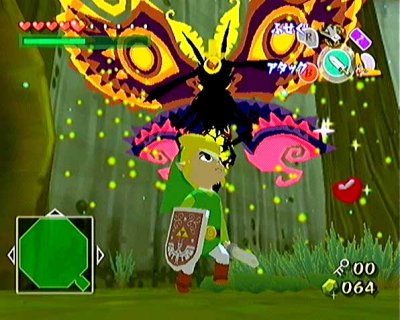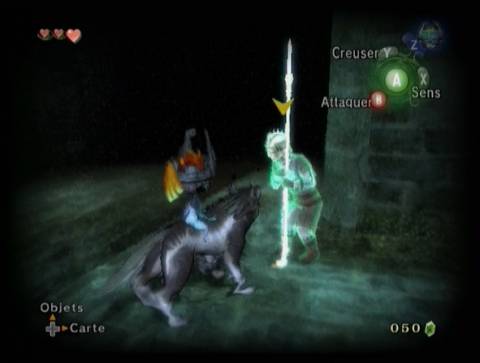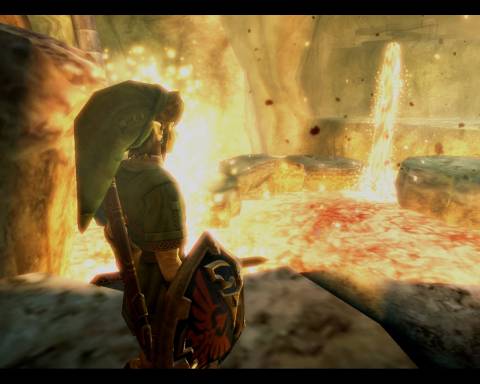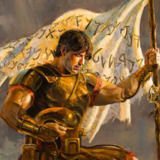Why I Didn't Like "Twilight Princess" All That Much
By MormonWarrior 38 Comments
I am, and have been from a very young age, a slobbering Zelda fan. I list among my favorite games many of the Zelda series, and I feel they aptly represent the best of all of Nintendo's consoles that they appear on.
This is about the one game in the series that severely disappointed me: Twilight Princess.
To start out, it was originally announced in 2003 that a new Zelda game was underway. A year later, at E3, a teaser was released demonstrating the return to Ocarina of Time's more realistic approach, unlike Wind Waker's cel-shaded cartoony appearance. I was very excited at the idea of another epic, land-based Zelda adventure with much-improved visuals over the N64 games.
What is most agonizing to point out, though, is that the game was released in November of 2006 (note: more than three years after the original announcement and after several meaningful delays) as a hacked-together port to Nintendo's new console, the Wii, and was released almost as an afterthought a month later onto the system it was actually developed for, the GameCube. What should have been Nintendo's crowning masterpiece and the finest game they had ever crafted turned out to be...just another Zelda game. For better and for worse.
Since then, Nintendo has released what I believe to be their best game yet: Super Mario Galaxy. It featured classic polygonal Mario gameplay, but adapted to their new console with a sense of polish nobody, Nintendo included, has been able to touch before or since. It also had top-notch visuals, the most sweeping, beautiful fully orchestrated soundtrack I've ever heard for any video game ever, plus it featured meaningful innovation and stylistic modifications to make Mario relevant in this day and age.

Twilight Princess, on the other hand, offers almost nothing to distinguish itself as meaningfully better than what Ocarina of Time accomplished back in 1998. The gameplay is largely identical with minor enhancements, the dungeons follow largely the same patterns and themes, the music is similar (and synthesized - though Nintendo had promised all along that it would be recorded with a full orchestra), and the world is largely similar too - Epona? Check. Zoras and Gorons? Check. Princess who largely messes things up and has to sort of atone for it? Check. It's telling that Nintendo even planned on putting Sheik in as a character at one point.
The biggest shortcoming, in fact, is that Twilight Princess is so by-the-numbers Zelda it's almost boring. Now, bear with me - games like Darksiders and Star Fox Adventures show quite plainly that Nintendo has a special gift for the style of gameplay that nobody else can match. However, it is obvious that Nintendo can do much better. Wind Waker was the sequel nobody was expecting. It was polarizing, even - many didn't like the new visual style, the sailing, and such. But that's what Nintendo's always been known for doing best - making fantastic and innovative games, even when you didn't think you wanted it. After Super Mario 64, every 3D platorming game followed closely in its footsteps except for one: Super Mario Sunshine, its own sequel. Majora's Mask, though recycling a lot of visual and audio assets from Ocarina of Time, was a vastly different game in focus and tone.
Everything in TP screams "fan service" to the worst of Zelda fans - those who are super vocal about the most geeky aspects of Zelda and whine when things aren't exactly their way. Tons of people played OoT back in N64 days, and all these people I've ever encountered have really positive memories about Ocarina of Time and would love to play it again or would recommend it. Many of these same people would never come near Twilight Princess, and I feel it is because it just doesn't make the same impact, nor does it meet the same requirements. The gameplay, style, focus, etc. of OoT was mindblowing even by N64 standards and still holds true, but copying that exact blueprint with new technology just comes off as weak and, quite frankly, too nerdy for its own good.
But let's get away from the vague theories and really get down to the core game here.
You start out as a young adult farmhand, a skilled and well-liked young man named Link. The game starts very slowly as you are tasked with herding goats, impressing the bratty kids in town, and getting on the good side of the local girl. The game holds your hand through familiar game mechanics for a while, then finally gets moving a little bit. Soon, you are acquainted with the game's main gimmick: Link's wolf transformation. The game plods along, tasking you with gathering numerous glowing orbs to restore a part of the landscape back from its twisted Twilight form. (These are a few of the many direct comparisons that can be made to 2006's arguably superior Zelda-esque title Okami.) A better sense of pace would have immediately helped the game. I find it funny that Nintendo Power, possibly the most ridiculously biased and one-sided magazine for reviews, gave the game a 9.5 on its scale, citing early development as a serious problem. That they didn't give the game a 10 is an incredible shocker, especially given how they went on and on about it leading up to its release. They went on to give Metroid Prime 3 and Super Smash Bros. Brawl, both decent but very flawed games in their own respect, a perfect 10.

After a few dungeons - formulaic but fun, as the game would prove to stay true to - you are finally able to switch between both forms on the fly, which should have been granted much earlier. The wolf form never develops any further than the initial abilities you have right at the beginning of the game, which is a real shame. It means you only use the form when absolutely necessary, and it's a bigger hassle to switch than it should be, since you can't do it in sight of anybody and it takes a whole discussion window and several button presses just to switch. As regular Link, the game is more or less identical to Ocarina of Time, with a few more sword abilities borrowed from Wind Waker and pulled from Super Smash Bros., just to appease the fans, you know. The swordplay doesn't feel as fluid or fun as Wind Waker, though, and most of the abilities you learn are pointless and just for show.
As far as the storyline goes, Twilight Princess ultimately fails to deliver. Midna is at least an intriguing character with lots of skeletons in her closet and an impish ability to cause trouble. However, she, as well as all of the other characters introduced throughout the game, are ultimately hollow shells without rhyme or reason. As the game begins, it truly seems to merit its "T for Teen" rating in darker tone and more thematic elements. As the game progresses, though, it never fulfills on the promise to be anything more than the classic Zelda story. Ganondorf is bad. He must be stopped. Why is he bad? Why does he want power? What will he do with it when he gets it? Nope, sorry. None of that here. It's even more primitive than previous games in that no motive is set up. He wants the Triforce and will do bad things with it. Naughty, naughty Ganondorf that never seems to do anything bad enough to really come off as that evil. To contrast, the first time you hear any mention of Ganondorf in Ocarina of Time, you hear it from the ancient tree spirit - the Deku Tree - in his final moments, since he has been mercilessly murdered for not cooperating.
In fact, OoT seemed to have the dark tone and creepy foreboding down much better on much more primitive hardware. The atmosphere of the adult temples is almost chilling, and the horrible things that exist in the future Hyrule are really kind of shocking, especially for an E-rated game. It even featured red blood splatter from the final boss - which was changed to green for the Wii Virtual Console and other recent versions, probably to conserve the rating. Twilight Princess seems to have that darker feel at first, but it never really captures it.
Also, in this day and age, where even Final Fantasy and Dragon Quest are fully voice-acted, it comes off as downright silly that Twilight Princess lacks this. Of all the games out there, the story in Twilight Princess would have benefited hugely by the inclusion of solid voice work. Link can remain silent all he wants, but all of the other characters would be so much better were they given more voice and personality. That pervading sense of antiquity in TP is summed up very well by Jeff Gerstmann himself in a review he did for Gamespot back when it released. I feel he was being simply merciful in giving it an 8.8.
The Wii controls do nothing to enhance the game, either. When it was first released, the new shiny Wii controls seemed like a cool thing to include, but now that the luster and initial coolness factor of motion waggle have worn off, it's painfully obvious that the controls were terribly thrown together. There's an annoying large fairy pointer that's present at all times unless all Wii controls are turned off, at which point it just becomes a bad control setup period. Pointer controls work okay at times and poorly at others, and replacing a button press to swing Link's sword with senseless shaking of the remote simply doesn't work right. Plus, several sound effects and musical cues are done through the crappy speaker on the remote, which leads to the need to turn off the sound for the thing. Just play it on the GameCube, folks.

The visuals of the game are another thing to mention. Twilight Princess looks solid, and has a pretty nice art style going for it. But it would most certainly not crack the top five best-looking games on the GameCube - among them Resident Evil 4, Metroid Prime 1 and 2, Wind Waker, Star Fox Adventures, and others. Texture work is fairly poor, in fact, and is rather perplexing. There are impressive moments in which the scale and style of the game are well-demonstrated, and others when it is kind of sloppy looking.
In short, Twilight Princess never delivered on the promise Nintendo made. Its presentation is relatively sub-par, the gameplay doesn't improve anything, and it makes numerous steps backwards while other games in the series boldly try new things and apply the Zelda formula in different ways. I don't think Twilight Princess is a horrible game by any means. I simply think it didn't accomplish anything new or impress like it should have, especially in light of how cinematically impressive games are becoming. I was very, very let down by this game.
